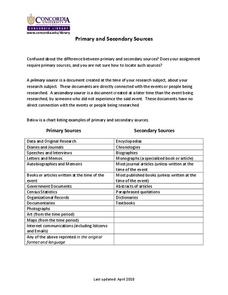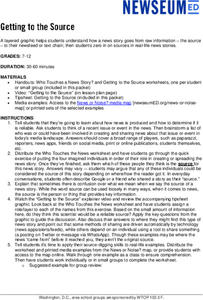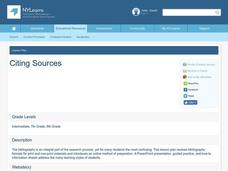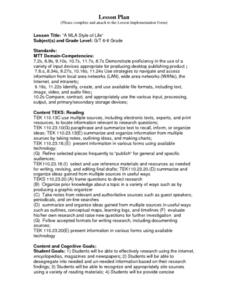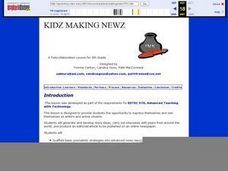George W. Bush Presidential Library and Museum
Teaching Primary and Secondary Sources
What makes a source primary or secondary? Middle schoolers read a definition of each term before exploring different examples and applying their knowledge to a research project.
Concordia University
Primary and Secondary Sources
Show your class the difference between primary sources and secondary sources. The first page provides a list of examples of each type of source. While they research, pupils can refer back to the list quickly to make sure they are reading...
Smithsonian Institution
Mary Henry: Journal/Diary Writing
A great way to connect social studies with language arts, a resource on Mary Henry's historical diary reinforces the concepts of primary and secondary sources. It comes with an easy-to-understand lesson plan, as well as the reference...
mdk12.org
Primary Source Quadrant Cards
Young historians can use this simple graphic organizer to define primary source and list both examples and non-examples of the term. A similar resource can also be constructed for secondary sources!
Newseum
Getting to the Source
Reliable news stories are based on facts from reliable sources. Young journalists learn how to evaluate the reliability of news sources by watching a short explainer video. Teams apply their new source-digging skills to a current news...
Houston Independent School District
Creating a Successful Project
Guide your learners step by step through the process of designing an original, independent student project. This resource includes a wealth of worksheets and materials, including student project checklists, timelines, primary and...
Curated OER
Primary and Secondary Documents for Colonial Times
Young scholars investigate the Colonial Era by completing a template on their computers. In this U.S. History lesson, students discuss the differences between primary and secondary sources and identify several different sources as...
Curated OER
Reporting on the 1920s
Use this roaring 1920s history lesson to have young writers research primary and secondary sources. They use their research to examine the events or famous public figures of the time period. Next, they imagine they're in the 1920s and...
Facebook
Versions of Media Texts
Verification of provenance and the original source of an image or video can be a long and winding process. Young journalists learn about the difficulty of finding the original source of a scrape, a copy of an original news story, and...
Curated OER
Evaluating Books
What are the characteristics of a good research source? At the beginning of a research project, have your class brainstorm evaluative criteria for primary and secondary source material. They then use the generated list to guide their...
Curated OER
Citing Sources
Practice citation skills with this activity, which takes learners to the Library/Media center. There, they will view a Powerpoint presentation and practice collecting data in both print and non-print sources. All necessary materials are...
iCivics
Drafting Board: Interest Groups
Does the influence of interest groups harm a political system? Your class members will analyze the role of interest groups in American politics, as well as consider the effect of perspective, bias, loyalty, and the...
Curated OER
"A MLA Style of Life"
Students effectively research using the internet, encylopedias, magazines and newspapers. They desegregate into needed and un-needed information based on their research findings. Pupils recognize and appropriately site sources using a...
VIF Learning Center
Languages as Reflection of Cultures and Civilizations: French Speaking Countries
Expand your class's vision of the French-speaking world by conducting this research project. Pupils focus on building 21st-century skills while they look up information about a French country and put together presentations.
Curated OER
Carbons to Computers
Pupils collect, organize, and analyze primary and secondary source information that documents a local office. (Students synthesize what they have learned to predict the office's organization and functions in the year 2025.)
Overcoming Obstacles
Designing an Action Plan
Outcome + available resources + schedule + timeline + steps to complete project = Action Plan! The second instructional activity in the "Service Learning" module outlines for scholars the steps to take when designing an...
Library of Congress
Industrial Revolution
Could you live without your phone? What about cars, steel, or clothing? Class groups collaborate to produce presentations that argue that either the telephone, the gramophone, the automobile, the textile industry, or the steel...
Curated OER
The Gold Rush Experience: Create Your Own Exhibit
Students create a virtual exhibit. In this gold rush lesson, students watch a movie about the California gold rush, view a virtual image of the gold nugget that started the gold rush and examine the sources. Students research and...
Curated OER
Research project
Eighth graders explore reference materials and then complete a research project. In this research project lesson, 8th graders choose the best reference source to use. Students learn to correctly site sources for their project....
Georgetown University
Tips and Techniques for Taking Notes in Class
From reading the class syllabi or listening for lecture indicators to considering typing vs. handwriting and formatting, read through this list of suggested note-taking tips that can help learners discover which techniques work best for...
iCivics
Drafting Board: Military Intervention
Should countries use their militaries to stop humanitarian crises in other countries? Learners make claims, organize their reasoning, and provide evidence for their arguments with this rich resource.
Curated OER
Kids Making News
Fifth graders correspond with one another regarding interesting global topics. They swap interview questions and collaborate in the publishing of an online newspaper. This should be a highly motivating lesson which get kids writing!
Curated OER
Evaluating Information Quality
Students evaluate information they are given and identify the quality of the information as fact, fiction, and point of view. In this information quality lesson plan, students also discuss how they can pick out good information verses...
Curated OER
Library Skills: Biography
Biographies deserve special attention when training youngsters how to use the library because they are alphabetized by subject rather than by author. Guide children through the process of finding biographies over a two-visit series. On...

